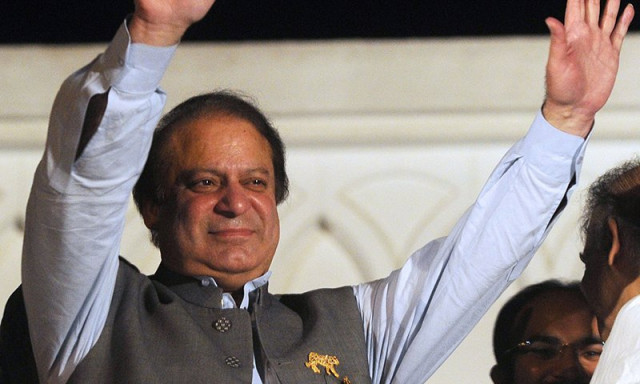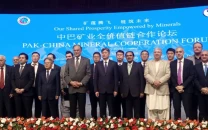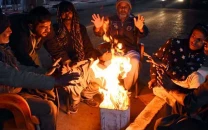11 predictions that could shape Pakistan’s political landscape in 2017
Find out if PM Nawaz will increase his influence and if India will join CPEC

Prime Minister Nawaz Sharif gestures at supporters. PHOTO: AFP
From the rise of Maryam Nawaz Sharif, Imran Khan falling into obscurity to better ties with India, here’s what we think is in store for Pakistan in 2017.
Local politics
Run-up to 2018 elections
Prime Minister Nawaz Sharif will consolidate his power and influence in 2017 and most of his policies will aim at winning the 2018 general elections. He’s slated to become an unprecedented fourth-time prime minister by forming a majority Pakistan Muslim League-Nawaz government by fall of 2018.
Pakistan economy has turned around: PM
On the other hand, Pakistan Peoples Party leaders Asif Ali Zardari and his 28-year-old son Bilawal Bhutto will enter parliament through by-election for two National Assembly seats vacated by relatives and close associates. The current Sindh Chief Minister Murad Ali Shah is likely to be inspired by Punjab CM Shahbaz Sharif and may leave footprint by cleaning up some of the mess Sindh province is in.
Pakistan Tehreek-e-Insaf’s Imran Khan will marginalise himself and be on a path to obscurity in time for 2018 elections.
The year will also see the rise of PM’s daughter Maryam Nawaz Sharif.
Civil-military relations
PM Nawaz will try to regain space lost to army during former army chief General Raheel Sharif’s tenure after PTI dharna and Peshawar school attack in 2014. There will also be negotiation for normalisation of relations with India and Afghanistan in order to ease regional trade.
Karachi
Struggle for Karachi’s political and financial space may continue, although with lesser force and much less overt power play. Muttahida Quami Movement is a likely winner in Karachi and Hyderabad in the 2018 general elections while Pak Sarzameen Party’s Mustafa Kamal may find little relevance in future reconfiguration.
Pakistan will suffer when, and if, US interest rates rise
Peace is likely to prevail generally, with occasional violence and target killings to achieve short-term objectives. Street crimes such as mugging and mobile snatching may continue at current levels unless political attention is paid to this aspect of governance.
Balochistan
With development of road infrastructure and job creation as part of China Pakistan Economic Corridor (CPEC), separatist nationalist sentiment in Balochistan is likely to decrease. Militant religious groups – currently a major force in the province – may continue to roam free, strike soft targets and result in civilian casualties unless Islamabad goes after an assault on them.
The province will also open up trade doors to the rest of Pakistan through Gwadar.
Terrorism
Since 2013, terrorism in Pakistan has been on a decline – down by three quarters. Currently, we are the fifth most-affected country in the world.
Pakistan’s economic uplift is our only agenda, says PM
In 2016, violence-related deaths reduced by over one-third. There were a total of 4,324 casualties in 2016, compared to 6,572 in 2015, with Karachi and Punjab improving and Quetta and Peshawar seeing a mild increase. The 2017 terrorism index will see much improved situation with terror attacks decreasing.
Home-grown militant groups are likely to be regulated under National Action Plan but it is unlikely they will lose their writ particularly in Balochistan.
International relations
India
Ties with India may start to normalise with onset of spring. Intermittent firing across Line of Control may continue to occur but won’t result into escalation of high-intensity conflict.
17 predictions for Pakistan’s economy in 2017
Under Chinese push for regional, multi-country trade, Pakistan will also be open to normalisation of ties with India. It may not be too far when India is brought into CPEC project - a goal China wishes to achieve sooner than later.
Afghanistan
Ties with Kabul may see an improvement after deterioration over the past few years. Trust between the two civilian governments may start to repair, with military backing the multi-stakeholder peace process.
Turkmenistan–Afghanistan–Pakistan–India natural gas pipeline may get a nod by all stakeholders – the government in Kabul, Taliban and independent warlords – for safety of pipeline route and construction work, although delays are expected.
US
US engagement with Pakistan will reduce further after strained ties over these recent years. Washington may no longer be interested in the ‘Pak’ part of its ‘AfPak’ strategy.
It’s too early to say how Donald Trump will shape his stance towards Pakistan. In pre-election Twitter diplomacy, Trump showed antagonistic attitude towards Pakistan, but during the days as President-elect, his call with PM Nawaz was quite amiable as he offered to play a role for all outstanding issues. Many in India read this as: Kashmir issue.
WEF report: Pakistan leaves India behind in IDI
China
Strategic cooperation partnership with China will see new heights. CPEC is a pilot corridor in China’s six-corridor One belt, One Road initiative worth $1 trillion. With early-harvest phase taking shape by end of 2017, the CPEC may bring other countries including India on board.
Pakistan will also become full member of China-led Shanghai Cooperation Organisation (SCO) in June 2017, along with India.
Russia
Pakistan’s relations with Russia will improve and see new engagement, thanks to China and SCO membership where Russia plays a key role alongside China.
Iran
After Iran agrees to negotiate amendment in Gas Sale Purchase Agreement, the Iran-Pakistan gas pipeline project may move on but at a slow pace. Bilateral trade with Iran may pick up after Western sanctions have been lifted and the Free Trade Agreement is likely by year-end.
Wali Zahid is a former journalist who now trains senior executives to improve workplace effectiveness. He tweets @walizahid



















COMMENTS
Comments are moderated and generally will be posted if they are on-topic and not abusive.
For more information, please see our Comments FAQ